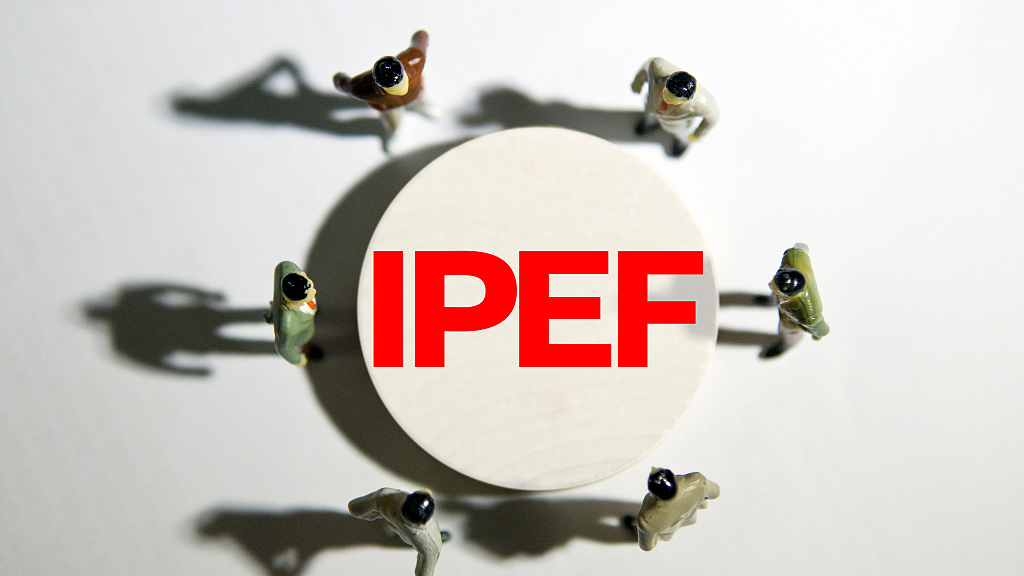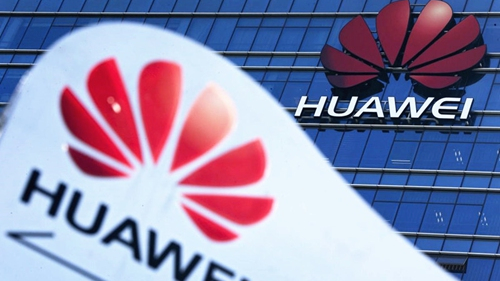
Editor's note: Hannan Hussain is a foreign affairs commentator and author. He is a Fulbright recipient at the University of Maryland and a former assistant researcher at the Islamabad Policy Research Institute. The article reflects the author's opinions and not necessarily the views of CGTN.
United States Trade Representative Katherine Tai and Commerce Secretary Gina Raimondo hosted the first in-person ministerial meeting of the Indo-Pacific Economic Framework (IPEF) last week in Los Angeles, immediately touted as an "undeniable success."
But there is compelling reason to hold off on that U.S. enthusiasm. After all, the IPEF is still without a working agreement, and last week's negotiations on trade failed to strike an all-out consensus with every state on board.
Several Asian countries that the U.S. is courting are also less swayed by the rhetoric: they are more interested in multilateral trading arrangements that lower tariffs and barriers to trade. Those aspirations are a damning indictment of Washington's track-record of withdrawing from key trading pacts. Little suggests that leadership from the bench will power a divisive framework's "success" projection.
The trade, supply chain, clean economy and fair economy "pillars" agreed in the ministerial meeting are an even stronger reminder of conflicting IPEF goals. The IPEF stems from Washington's principal "Indo-Pacific strategy" which puts a premium on containing China, and not the advancement of "high-standard, inclusive, free, fair, and open trade" arrangements that the IPEF endorsed.
Washington has also balked at reducing tariffs and even championed trade barriers on bilateral grounds. This raises serious questions about how the containment initiative will fuel "investment, [and] promote sustainable and inclusive economic growth" in a region that banks enormously on trade transparency.
The second IPEF pillar on "supply chains" is a poor sell as well; especially when Washington – IPEF's chief author – has been working to optimize disruptions and vulnerabilities in supply chains within Asia. Look no further than attempts at provocation through the exercise of so-called U.S. export controls against China, and the resulting complication in independent supply arrangements for major producers of critical materials in Asia.

The logo of China's tech giant Huawei. /Xinhua
The logo of China's tech giant Huawei. /Xinhua
Unlike the IPEF, key players – including states within the Association of Southeast Asian Nations (ASEAN) – can always tap into their own autonomy on supply sharing policies without necessarily being tethered to a containment-led economic agenda.
The IPEF refuses to undo the U.S. actions that have pushed Asia's sophisticated technology producers into a tight spot, and takes no notice of America's unilateral sanctions and tariffs at the expense of equal trade standards and truly inclusive cooperation. As a result, simply dressing up the IPEF's inaugural in-person meeting as some springboard for "enormous economic value" is extremely premature.
India's lack of agreement to the IPEF's trade commitments captures underlying divisions perfectly. New Delhi went on its own tangent, promising to engage with the IPEF on trade characteristics, only to contradict itself by suggesting that formal association was presently out of reach.
New Delhi decided to stay out of the official joint statement of the IPEF's trade pillar, and India's own Minister of Commerce signaled concerns over likely discriminatory clauses. "We have to see what benefits member countries will derive and whether any conditionalities on aspects like environment may discriminate against developing countries, who have the imperative to provide low cost and affordable energy to meet the needs of our growing economy," said Minister Piyush Goyal.
Such underlying differences are difficult to ignore when the IPEF itself is a framework predicated on selective engagement in Asia, and yet touts itself as a force for "inclusivity." Moreover, the IPEF meeting in Los Angeles should be seen as another fleeting moment because the true test of its endurance is an agreement that caters to the will and participation of every Asian state under a true "rules-based" system.
As it stands, Washington has declined to offer any clarity on that agreement thus far. What it did indicate was a second ministerial meeting to build on divisive commitments, just like the U.S.-led "Indo-Pacific strategy" that commands it.
(If you want to contribute and have specific expertise, please contact us at opinions@cgtn.com. Follow @thouse_opinions on Twitter to discover the latest commentaries on CGTN Opinion Section.)

